- Home
- Robin Hobb
The Inheritance Page 3
The Inheritance Read online
Page 3
“That is my name on my world. But humans call me Lavender.”
“The Skoag?” Mom asked, but I was already past her and undoing the flimsy dead bolt on the door. I had to see it. It was so impossible for a Skoag to be outside our door at night that I had to see it was real. “Billy!” Mom warned, but I dragged the door open anyway.
The Skoag was there. The same purple-crested one we had listened to earlier. Only he looked a lot smaller with all his bladders deflated, not much bigger than my mom. He was wearing a sort of pouch thing on his front, and in it was a brown grocery sack, a bouquet of flowers wrapped in green tissue paper, and a skinny brown liquor store bag. He was draped in the transparent plastic robe Skoags were supposed to wear in human dwellings. His skin glistened through it in the watery streetlamp light like oil on a puddle, iridescent and shifting. His fat little flippers waved up and down slowly, like a fish underwater. His murky blue eye spots fixed on my mother.
She stared back at him. She still had the knife in her hand, but she had forgotten it. She crossed her arms, a closing, denying gesture. “What do you want?” she demanded, in the scared stubborn voice she kept for the landlord.
A little bladder above his eyes pulsed with his cello voice. “To come in.”
“Well, you can’t,” she said, at the same time as I asked, “How did you get down the steps?”
“With great difficulty,” he pulsed at me, but there was a violin squibble above the cello that made his answer a sort of joke. I grinned at him; I couldn’t help it. He’d noticed me. He’d answered my question before he paid attention to what my mom had said, and he’d answered it in the way one buddy might kid with another. I felt two feet taller.
He looked back at Mom, waiting.
“Go away,” she told him.
“I cannot,” he said, all cello again. “Earlier today, I heard you listening to us. I think. My companions tell me it was not so, that I am tricking myself because I want too badly. But I am not deceived. I have hope only. I have brought gifts. Flowers and wine for you, as is fitting, and food for your child, who said he was hungry. May I come in?”
She just stood there, staring at him. A car shushed by in the rainy street outside, and the wind gusted, blowing cold air down our steps and in past the Skoag. And still they both just stood there, waiting for something.
“I love you,” the cello thrummed, and the sound swelled, like a big warm wave washing through our apartment. The sound didn’t end with the words, it went on with musiclike embroidery on the edges of the thought. I listened to it pass and fade, and then the silence came behind it, separating us again. The silence seemed unbearable.
“Come in,” said my mother.
So Lavender came to live with us.
Everything changed.
Everything.
Within just a few days, the neighbors stopped knowing us. I’d walk down the streets, and rocks would bounce around me, but I’d never see who’d thrown them. The radio was never turned on again. There was real food, every day. Mom stopped looking at street musicians and haunting the open mikes. The street people called her ugly names, and our mailbox got ripped off the wall in the upstairs lobby. I got into so many fights at school that the principal said I had to stay in at recesses for the rest of the year. After that, I was left totally alone. I didn’t care. Because I had Lavender at home.
Every day I went to school, because Lavender said I should. It would be important later, he assured me, and that was enough for me. Every day I came home and slid down the ridged ramp that had replaced our steps. And Lavender was always waiting for me to come home, even if my mother wasn’t there. Always before, Mom’s musicians had tolerated and ignored me, treated me like a cat or a houseplant, a semiannoying creature that lived in my mother’s house. Not Lavender. He knew I was there, and he was glad. He made me important. We would have a snack together, he rubbing his sludgy porridge through a membrane on his chest, me munching cookies and milk. Then I had to show him every single paper I’d brought home, read aloud from every library book I’d checked out. All I did amazed him. But mostly we’d talk and laugh. His laugh reminded me of a giant grasshopper chirring. Once he told me that Skoags had never laughed before they came to Earth, but the idea of a special sound made just to show happiness was so wonderful that now it was the first thing that all exiles were allowed to do. Each Skoag got to make up his own kind of laugh. He said it like it was some big favor for them. Then he told me that my laugh was one of the best ones he’d ever heard. That first day, when he’d heard my laugh in the street, he’d known that anyone who could create so marvelous a sound had to be very special indeed. And then he laughed my own laugh for me to hear, and that set me laughing; and we laughed together for about ten minutes, in harmony, like a new kind of song.
Looking back, I know he didn’t understand much of basic human needs. Because he learned mostly from me, he had a seven-year-old boy’s idea of what was important. Food he understood, and he always made sure there was plenty of it, though he tended to buy the same kinds over and over again. He loved bright, simple toys that moved, yo-yos and tops and plastic gliders, marbles and Super Balls and Frisbees. I’m convinced he thought that flowers were essential to my mother, and he filled our little apartment with graceful glass vases full of them. I never thought to ask for anything more than what he brought and I know my mother never did. She was too used to giving to learn taking easily. Still, Lavender tried to provide for us. I remember the day I came home and found him cautiously touching his flippers to the protruding nails and scabs of Sheetrock on the two-by-four wall studs. “This pleases the Mom?” he asked me.
“No. It’s really ugly. But it’s all we’ve got,” I told him. A wrinkling ran over his deflated bladders, a gesture I had learned was like an excited grin. “This would please the Mom?” the cello thrummed, and he began pulling yards and yards of stuff out of his belly pouch. Shiny like plastic, but soft like fabric, and so thin you could crumple up a square yard of it in your fist. He began fastening it to the wall, in graceful drapery, and as it fell straight, the room warmed with both color and heat, the musky basement smell faded, and a gentle light suffused the room. Then we hid in the closet until my mom came home and was surprised by it. “Oh, Lavender, you cover up all the rough edges of my life,” Mom told him. For a long time, I thought she meant the wall studs. He could make the hanging different colors, and he adjusted it almost daily, though I never asked how. If I had, he would have told me. I just didn’t ask.
He told me anything I wanted to know. I knew more about Skoags than any of the “experts” of that time. Anything I asked him, he answered. I knew that they had been exiled to our world because they sang in public, and that was not permitted in their home world. I knew that they sang only other people’s music, because making up new music was something only a holy leader could do. The Earth Skoags were religious rebels, sort of like the Pilgrims. They believed singing was so worshipful that Skoags should do it all the time, everywhere, and that everyone should do it, not just priest-Skoags. On their own world, that was heresy, and anyone caught at it had to choose between exile or “a most unfortunate happening.” For a long time I didn’t know what he meant by that. A lot of what he told me was puzzling. Lavender kept trying to explain to me that singing was a circle, and that if one sang well enough to make the perfect music, it would create the one that would close the circle. My mom, he said, was “Close. Almost the end of the circle. The one, but not quite.” I never understood what he meant, but it was very important to him. A day didn’t pass without him trying to make me understand. There just weren’t human words for the Skoag ideas. It worried him very much. It was the only hole in our communication. He told me other stuff, like how some Skoags had long, articulated flippers like my fingers, and how they were dehydrated for their space journeys, and how they thought of humans as “half sexed” because we weren’t self-fertile. Anything I asked, he answered. But if I didn’t ask, he didn’t bother me with it. I never asked him if he had come to end his people’s exile, or if he were a very important Skoag on his world or how their spaceships operated. Or he would have told me. But I didn’t ask.
In the long evenings, Lavender made music for us, playing anything we wanted. He knew every song my mother ever asked for and could do them in any artist’s style. She would sit on the end of my couch, my feet warm against her, listening raptly while Lavender played until I fell asleep. Mornings I would waken to his slaps on the door and run to let him in. He’d be laden with cereal and milk and fruit and a packet of his own gruelly food, and always fresh flowers for Mom. He’d play back to me all the new sounds he’d heard in the night city, not just the music that drifted out from the bars, but seagulls crying over the bay, and the coughing of winos and the barking of dogs. It was always hard to go to school. I was sure they had fun without me all day at home, but to please Lavender, I went.
Life was good. There was food and talk and warmth at home, and that’s all most kids ask. But on top of all that, I had Lavender. The value of that is too great to tell. For over a year, the world was as good as it could possibly be.
One day my mother touched him. By accident. I know, because I was there when it happened. So simple, so stupid. She slipped on the kitchen floor, reached out to steady herself and caught Lavender’s flipper. Lavender’s bare flipper tip, shining with Skoag slime, caught my mother’s hand, steadied her, and transported her to ecstasy. Her face changed, she cried out, a simple “oh” like a kid seeing his first Christmas tree, and sat down on the kitchen floor. She just sat and smiled. Lavender gently pulled his flipper free of her grip, but it was too late. His dark blue eye spots fastened on me.
“You didn’t do it on purpose,” I told him. “It wasn’t your fault.” But my heart was shaking my whole body.
A scant second later, Mom was standing up, saying, “I’m all right. Don’t be upset, Lavender. Stop flapping like that. Billy, don’t stare, I’m fine.” She caught at the edge of the kitchen table, sat down in one of the chairs. “Shit. What a rush!” she said a moment later, and then sighed. And got up from the table and went to the stove and started stirring the spaghetti sauce again. And that was that. Whew, I thought as my mind darted to my Don’t Do Drugs book at school. I’m glad Mom didn’t turn into a Skoag gropie.
But, of course, she did.
At first she never touched Lavender when I was around. And kids don’t notice gradual changes. I’d get home from school, and she’d be sitting at the table, humming to herself. It got harder to get her attention. More and more, she told me to fix my own supper. At first she’d tell me what to cook, but later she’d just wave at the fridge. After a while, Lavender learned about frozen dinners and bought them for us. One day when I got home, I found that Lavender had replaced our little aid-issued microwave cooker with a more elaborate one. I cooked all the meals from then on. But even then, I didn’t catch on.
If I suspected anything, it was only that Mom and Lavender were growing closer. That first night he had said he loved her. That had never seemed strange to me. I loved my mom, a lot of musicians had said they loved her, so why shouldn’t a strange Skoag standing on the doorstep say it? I never doubted it was true, and I don’t think Mom did either. Lavender never missed a chance to show how important “the Mom” was. Not just the flowers, or the way he played whatever she wanted him to play. It was the way he respected her in a way no one else ever had. He made her listening as important as his playing.
And it started being more and more important. Now when he played for her at night, he’d stop, sometimes in the middle of the music, and say, “Is that it? Is that right?”
“No,” she’d say, and he’d deflate with despair.
Or, “Almost,” she’d say, and hum a bit to herself, a swatch of music nothing like what he’d been playing, but he’d say, “I think I hear,” and try again.
And if she said, “Yes, yes, that’s it,” he’d play the piece over and over again, while she sat and nodded and smiled. Slowly she changed. She didn’t care about her clothes anymore, and she seldom went outside. She got fat and bought big men’s shirts from the secondhand store to cover her belly. She became fussy about her hair, brushing and combing it like a fussy fiddler tuning his strings. Her voice changed, becoming dreamy and muffled, the ends of her words blunting. Sometimes when I got home from school, she’d be sitting at the table, dreaming with her eyes open. I’d talk to her but get no response until Lavender came to stand beside her. Then she’d focus on me, and answer my questions in a sweet, dreamy voice.
It was easier to talk to Lavender instead. He always knew everything anyway, and Mom was so happy and dreamy that I didn’t worry about anything being wrong. She wasn’t like the filthy, skinny Skoag gropies in the schoolbook. She was clean, and shining with health and dreams, plump and pretty. About then I found out Lavender didn’t always leave at night anymore, but sometimes lay on the bed beside her, with Mom gripping his flipper all night, her head pillowed on his plastic-coated body. So I should have known she was a Skoag gropie, right, and realized she was stone deaf. How could I? I was a kid, she didn’t look like a gropie, and even if she ignored me a lot, she was still my mom. And she still listened every night to Lavender’s playing.
Even I was enchanted by his music. Mom no longer asked for stuff by titles, and I had never cared what he played. What had mattered to me was that he was playing for me as well as for Mom. That last bit of special attention at the end of the day was what mattered to me. But slowly that changed, as the music he played changed. He started playing a lot of stuff I didn’t know. Some of it was dreary and mournful, and sometimes the words were in a different language. Sometimes it was full of strings and campfires, and sometimes it sounded like brass challenges and steel replies. But sometimes the music was so strange and wonderful it made the hair stand up on my arms and legs and tickled the back of my neck. I began to understand how my mother could live for music. Some of the music he played made my heart want to dance outside my body, pulled me from my sofa to sit beside Lavender’s fat, calloused feet-flippers, hypnotized me with joy. And some of it made me cry, isolated stinging tears because I could almost, but not quite, tell what the music was about.
That had to be Lavender’s music. No one else could have made up such music, music that knew me so well. It had to be his original music. But Skoags weren’t allowed to make their own music. Unless they were priest-Skoags, composing for the temples.
In February, the first package came for Lavender. It was at the bottom of the ramp when I got home, and I picked it up and took it into the house. Just a little flat black plastic box. “Look what I found,” I said as I came in the door, and Lavender came immediately and took it from me.
“For me,” he told me. “A message.” His cello strings quivered unnaturally as he slipped it into his pouch. I never saw him open it, and he didn’t speak of it again, just asked to see my school papers.
There were three more after that, or perhaps four. Always at the bottom of the ramp when I got home from school, and always Lavender took them. One day it started raining on my way home and when I got to our house, there were flipper prints outlined on the ramp, leading to the flat black box. So Skoags left them. I wondered why the Skoags were sending him messages instead of just talking to him.
The last message box was silver, not black. Lavender held it for a long time, just looking at it. Then the muscles around his eye spots moved and he looked at my mom for a long time. She knew something about those message boxes, and it wasn’t good. I wanted terribly to know what it was, but I was too frightened to ask. Silence wrapped me so tightly it cut into me like wires. I went to Mom, and she held me against her fat stomach and stroked my head like I was a baby. Then she gave me a gentle push and pointed to the door. I was to go outside.
“I’m not a baby anymore,” I said angrily, knowing I was being shut off from something.
“No,” said Lavender. He moved a slow flipper, and Mom let go of me. “You certainly aren’t. You are old enough to be trusted with important things.” He paused, then the cello thrummed rapidly. “Billy Boy. I have made the other Skoags very angry by being here with you. They demand I come back to them and live as they wish me to live. I cannot. Tomorrow I will go to tell them that. There may be . . .” the cello sighed wordlessly, then went on, “a great unpleasantness for me. A most unfortunate happening, perhaps. Until I come back, I will rely on you to take care of the Mom.” He turned slowly until he faced my mom again. “That is all there is to say. Billy does not need to leave.” She bowed her head, accepting his wishes. He spoke no more about it but went about the apartment tunelessly humming and adjusting the wall hanging from pale mauve to a sky blue.
That evening he played long, wordless songs with lots of strings and high-pitched wind instruments. I fell asleep to music like seagulls crying after a storm.
The next day when I got home from school, Lavender wasn’t there. Mom was sitting at the table. She didn’t even look up until I slapped my schoolbooks down in front of her. Then she looked up with eyes as flat and dark as Lavender’s eye spots. Her face was like the day she’d given Teddy our check, but a thousand times worse. “Billy,” she said, in a low swollen voice like her mouth was packed with marshmallows. She reached for me, to pull me near, but the palms of her hands were scarred with iridescence, like the pictures in the Don’t Do Drugs textbook. Suddenly I couldn’t let her touch me. My mind tagged and rejected the truth. I pulled back, feeling betrayed, knowing something was terribly, terribly wrong. “Lavender!” I cried, but no cello sawed an answer. I looked again at my mom, at her scarred hands and her deaf loneliness. I saw what he had done, but his not being here, now, was worse.

 Ship of Destiny
Ship of Destiny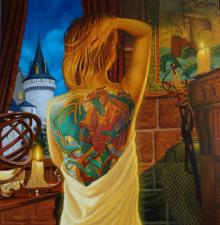 Golden Fool
Golden Fool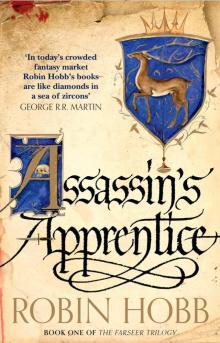 Assassins Apprentice
Assassins Apprentice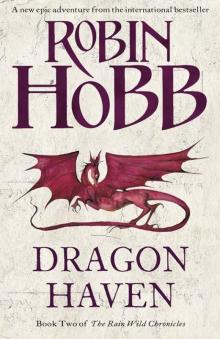 The Dragon Keeper
The Dragon Keeper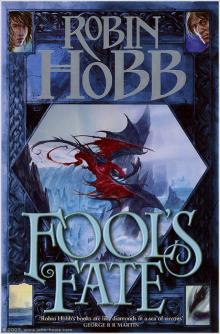 Fools Fate
Fools Fate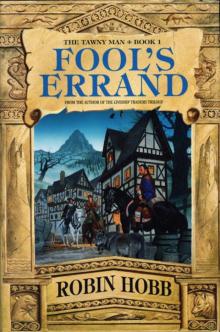 Fools Errand
Fools Errand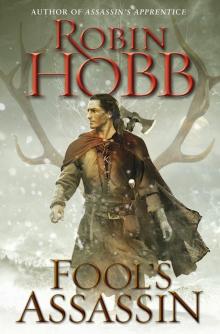 Fools Assassin
Fools Assassin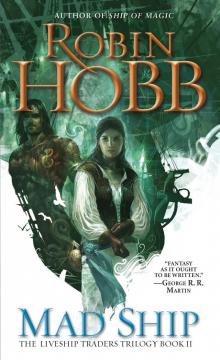 The Mad Ship
The Mad Ship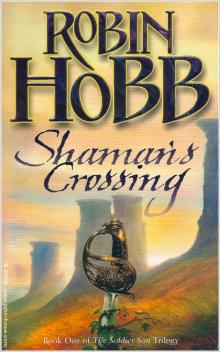 Shamans Crossing
Shamans Crossing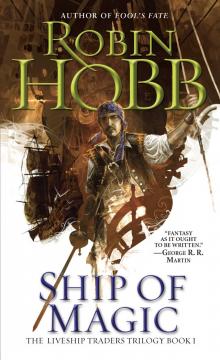 Ship of Magic
Ship of Magic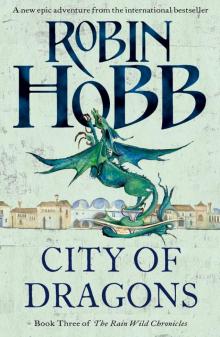 City of Dragons
City of Dragons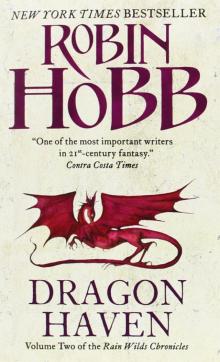 Dragon Haven
Dragon Haven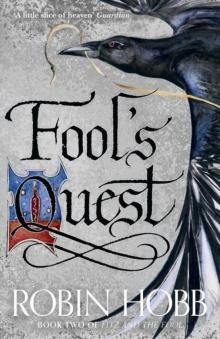 Fools Quest
Fools Quest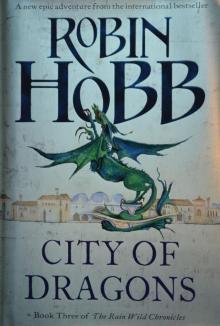 Blood of Dragons
Blood of Dragons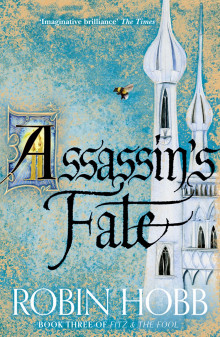 Assassin's Fate
Assassin's Fate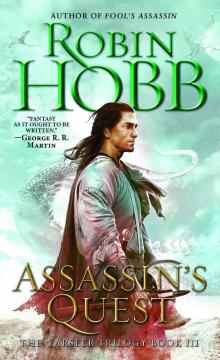 Assassins Quest
Assassins Quest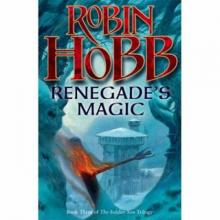 Renegades Magic
Renegades Magic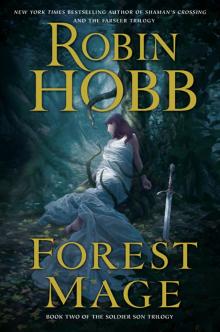 Forest Mage
Forest Mage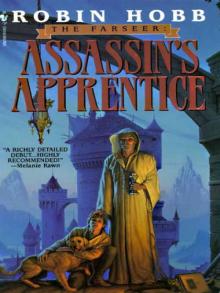 Assassin's Apprentice tft-1
Assassin's Apprentice tft-1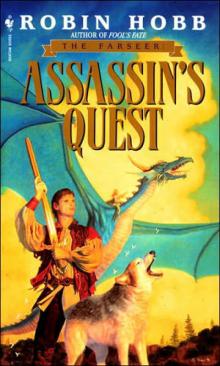 Assassin's Quest tft-3
Assassin's Quest tft-3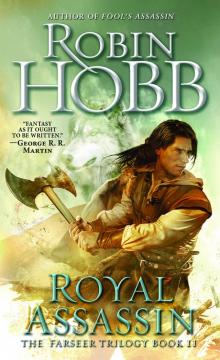 Royal Assassin
Royal Assassin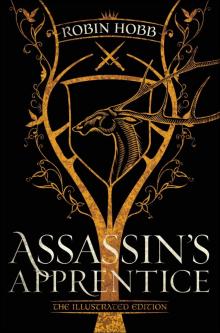 Assassin's Apprentice (The Illustrated Edition)
Assassin's Apprentice (The Illustrated Edition)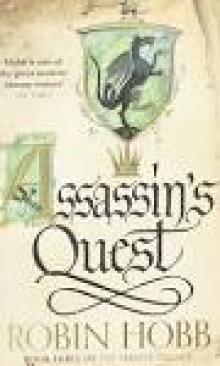 Assassin's Quest (UK)
Assassin's Quest (UK) Royal Assassin (UK)
Royal Assassin (UK)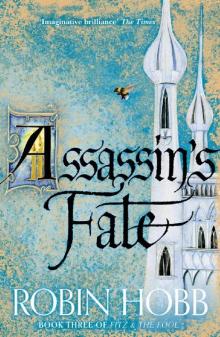 FF3 Assassin’s Fate
FF3 Assassin’s Fate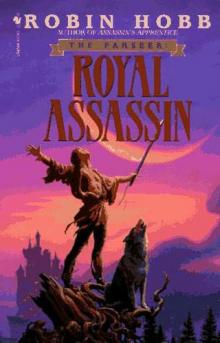 Royal Assassin tft-2
Royal Assassin tft-2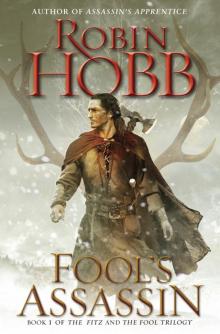 Fool’s Assassin: Book One of the Fitz and the Fool Trilogy
Fool’s Assassin: Book One of the Fitz and the Fool Trilogy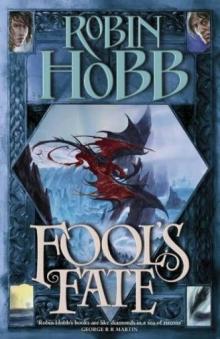 Fool's Fate ttm-3
Fool's Fate ttm-3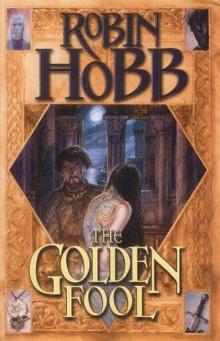 The Golden Fool ttm-2
The Golden Fool ttm-2 The Liveship Traders Series
The Liveship Traders Series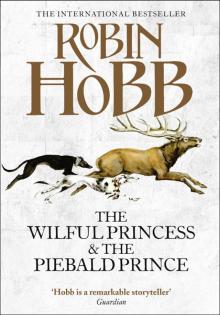 The Wilful Princess and the Piebald Prince
The Wilful Princess and the Piebald Prince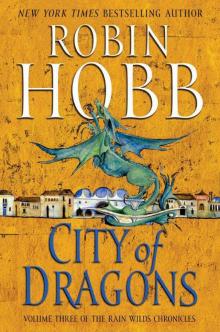 City of Dragons rwc-3
City of Dragons rwc-3 The Tawny Man 1 - Fool's Errand
The Tawny Man 1 - Fool's Errand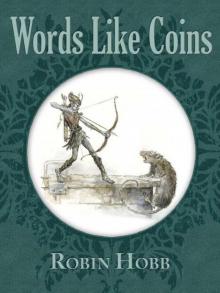 Words Like Coins
Words Like Coins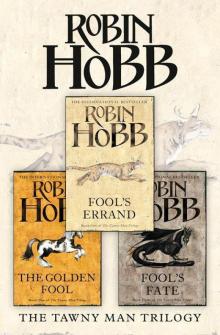 The Complete Tawny Man Trilogy Omnibus
The Complete Tawny Man Trilogy Omnibus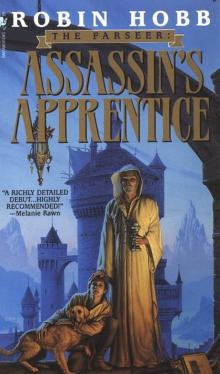 Farseer 1 - Assassin's Apprentice
Farseer 1 - Assassin's Apprentice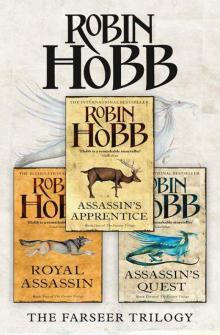 The Complete Farseer Trilogy Omnibus
The Complete Farseer Trilogy Omnibus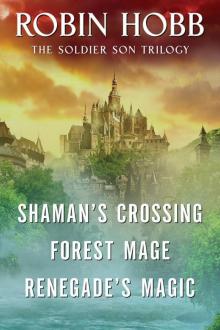 The Soldier Son Trilogy Bundle
The Soldier Son Trilogy Bundle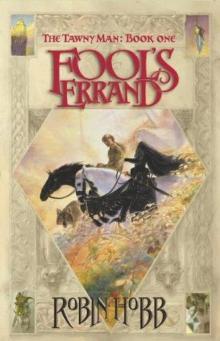 Fool's Errand ttm-1
Fool's Errand ttm-1 Blue Boots
Blue Boots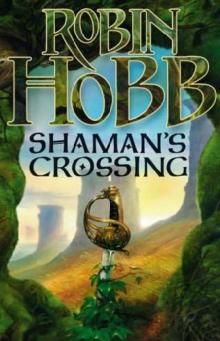 Shaman's Crossing ss-1
Shaman's Crossing ss-1 Mad Ship
Mad Ship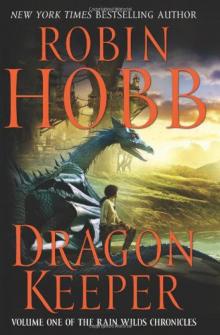 Dragon Keeper
Dragon Keeper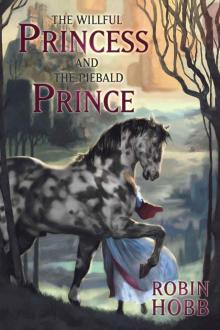 The Willful Princess and the Piebald Prince
The Willful Princess and the Piebald Prince Ship of Destiny tlt-3
Ship of Destiny tlt-3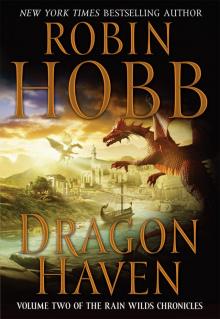 Rain Wild Chronicles 02 - Dragon Haven
Rain Wild Chronicles 02 - Dragon Haven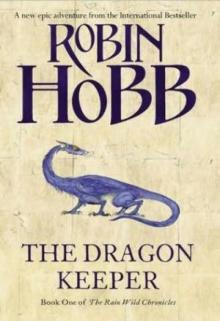 The Dragon Keeper trwc-1
The Dragon Keeper trwc-1 The Triumph
The Triumph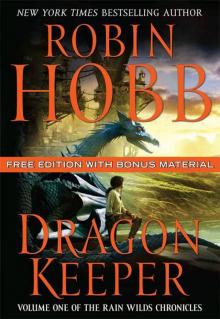 Dragon Keeper Free Edition with Bonus Material
Dragon Keeper Free Edition with Bonus Material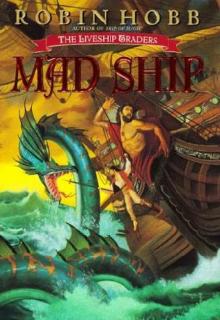 Mad Ship tlt-2
Mad Ship tlt-2 The Inheritance and Other Stories
The Inheritance and Other Stories Tawny Man 02 - Golden Fool
Tawny Man 02 - Golden Fool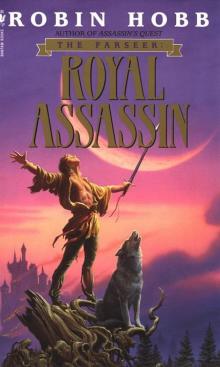 Farseer 2 - Royal Assassin
Farseer 2 - Royal Assassin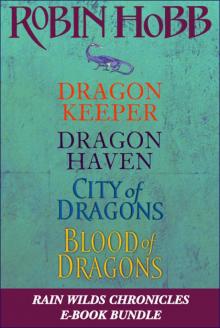 Rain Wilds Chronicles
Rain Wilds Chronicles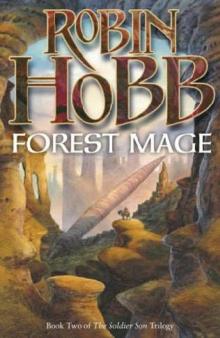 Forest Mage ss-2
Forest Mage ss-2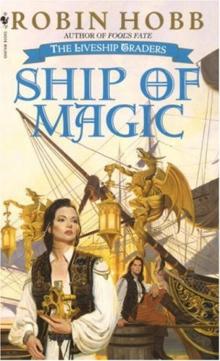 Ship of Magic lt-1
Ship of Magic lt-1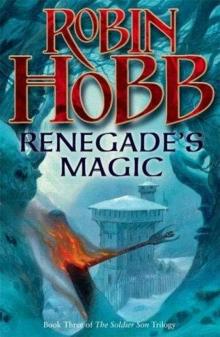 Renegade's Magic ss-3
Renegade's Magic ss-3